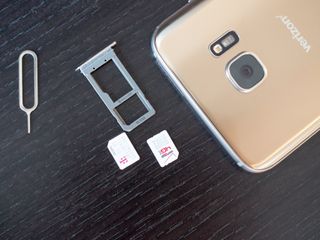The Big Four U.S. carriers are joining together to build a new mobile authentication solution

AT&T, Sprint, T-Mobile and Verizon have joined forces and created what they are calling the Mobile Authentication Taskforce.
Because hacking, identity theft, and phishing are becoming a bigger problem, especially with mobile devices, the carriers want to create a system to make sure you are who you claim to be when using your phone for things like banking or shopping. Going through the hassle of fixing any type of bank or credit card fraud or data theft in general is no fun, but it's especially expensive on the enterprise end. With more and more unethical people looking for ways to exploit your phone's software or trick you into giving away your passwords, this is a problem that's not going away anytime soon.
This is an area where the carriers can help. They have plenty of ways to check where and when a phone is being used and can build a pattern to check against anytime you need to prove your identity with your phone.
With the four largest U.S. mobile network operators onboard, the Mobile Authentication Taskforce possesses significant capabilities and insights to address this issue, such as network-based device authentication, geo-location and SIM card recognition.
The GSMA (Groupe Spécial Mobile Association) is working closely with the carriers on the project. Alex Sinclair, the GSMA's Chief Technology Officer says this will cut down on fraud and data theft and that they are monitoring things to make sure the solution is interoperable with all the carriers and their different systems.
Through strong collaboration, the taskforce announced today has the potential to create impactful benefits for U.S. customers by helping to decrease fraud and identity theft, and increase trust in online transactions. Further, we will be working closely with the taskforce to ensure this solution is aligned and interoperable with solutions deployed by operators.
There are potential drawbacks as well. Carriers aren't exactly known for their rigid standards of protecting our data, and any identification system tied to your SIM card could potentially be held hostage until any contract conditions are met. Still, if the carriers can get together to keep us and all of our data a little safer that's a good thing. We hope they come up with an easy and secure system that benefits the users as well as the carriers themselves.
In the meantime, everyone should follow a few basic security practices like using a secure lock screen, strong passwords and two-factor authentication wherever it's offered. Keep your data safe!
More: Two-factor authentication: What you need to know
Be an expert in 5 minutes
Get the latest news from Android Central, your trusted companion in the world of Android

Jerry is an amateur woodworker and struggling shade tree mechanic. There's nothing he can't take apart, but many things he can't reassemble. You'll find him writing and speaking his loud opinion on Android Central and occasionally on Twitter.
